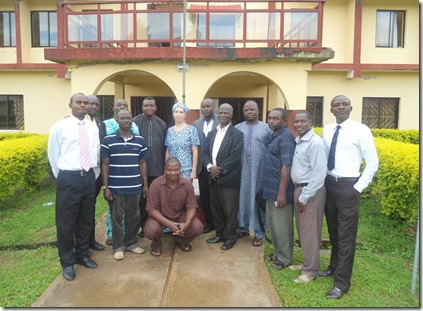“We are praying you will get married.” I couldn’t help but inwardly chuckle at the sincere promise from my students, all married Nigerian pastors, at the end of my time teaching in their seminary. I wasn’t quite sure how that would match their second promise to pray for my return, next time to live there permanently.
Four years ago I took my first trip to teach in central Nigeria, a country where women are expected to be married by their early twenties. The first time I stepped into a classroom of graduate students who were all married men (mostly pastors), I wondered if I, as a single woman, would hold any credence. (Fortunately, my education meant a LOT there, and, along with my international experience living on four continents, made up for some forms of low status.) While I did get plenty of comments and questions about my singlehood, I was also aware this kind of a trip would’ve been a lot more complicated if I was a wife and mother. The reality is that we have a daily choice of whether to rejoice in the positive aspects of being single or to complain about what is lacking.
One of my early classes… all married men.
While there are quite a few important singles throughout the Bible, there is significant set of single friendships that recently stood out me: Martha, Mary, Lazarus, and Jesus. The beauty of these relationships can illustrate reasons we can be grateful as singles.
1) Singles can optimize their unique personalities and gifts.
I love the contrast displayed between Mary and Martha. Both clearly loved and respected Jesus, but expressed it in different ways. Martha was organized and servant-hearted. She made sure the house was ready and the meal was served when Jesus was visiting (and got frustrated when Mary wasn’t helping enough). Mary wanted to learn from Jesus, sitting at His feet and giving full attention. Jesus accepted both expressions of love, with a little extra validation for the one who acted outside of the box and was certainly criticized by those around her.
As singles, we are free to be the people God made us to be, pursuing the gifts we have been given during the season (whether short or permanent) of greater feasibility. My house can be decorated and equipped for my own interests and ministries. My schedule is not limited by the needs, hopes, and intentions of a husband or kids. Unfortunately, others sometimes use such logic as a reason to delegate extra tasks to singles (“Since you don’t have to take care of a family…”), making it important to set boundaries and priorities—just like Mary chose to devote time to listening to Jesus.
2) Singles can have intimate friendships.
When their brother Lazarus was sick, Mary and Martha called out to Jesus. They loved Him and knew of His love for them. Jesus showed that love when weeping with them, before using the death (and resurrection) of Lazarus for the glory of God. The relationship these sisters had with Jesus wouldn’t have been possible if they were married; such direct attention toward Him would’ve been compared to their relationships with their husbands, and likely reprimanded.
While we have to be careful to be seen as “above reproach” and aware of cultural norms, as singles there is still a place to develop close relationships with those around us. We won’t in any way be detracting from a marital relationship when sharing our hearts with others. Although such relationships require intentionality and investment, those friendships can be a rich place to exchange agape love, expressed through encouragement, comfort, and accountability, challenging one another and observing the rich growth that follows.
3) Singles can devote time and resources to loving God and others.
Jesus knew what house was available whenever He was in Bethany. Mary devoted her expensive perfume to anointing Jesus’ feet. Martha ran the house and coordinated large meals.
As singles, we generally don’t need to retreat to the bathroom to find a quiet place for prayer. It’s still very easy to get distracted by all the other tasks pending, but we can choose to set aside a specific time to be with Jesus, to pour out at His feet everything that is valuable. We can intentionally make whatever our responsibilities on the field are into ways of expressing love to others.

4) Singles can make risky decisions more simply.
Mary, Martha, and Lazarus repeatedly welcomed Jesus into their home while aware of the imminent threats to kill him Him. The Pharisees were even talking about killing Lazarus for his testimony of being raised from the dead, yet they continued to offer care for Him. Would they have acted the same way if it meant putting their entire families in danger? I don’t know, but I’m guessing it would’ve taken a lot more consideration.
I have recently been thinking about the “theology of risk” that has to be considered when feeling called to serve God in potentially dangerous places. I don’t have a “right answer” on the balance between wise choices and trusting God in place of high risk. However, I do know that I would feel much more hesitant to go into a place of higher risk when responsible for the lives of my family members than when considering only my own life. This doesn’t give me liberty to act foolishly, my actions will always affect others, but it takes a significant factor out of the equation.
Big decisions should never be made without insight from others’ perspective, and singles may need to be proactive in receiving input and support from those well-experienced. Yet, coordinating rapid responses can be simpler for an individual than a family, allowing more flexibility. My trips for disaster response, flying to situations such as earthquakes and mudslides, were feasible in part because I was the only one whose schedule had to be adjusted.
Both singles and couples have value!
While there are also many reasons to rejoice in being married on the mission field, there are many reasons to appreciate being single. So for the many singles out there, take heart! God can use you in amazing ways during this season of your life (however long that might be).
For those who married, remember the value of showing love to the singles around you. They need intimate friendships, which aren’t always available from other singles, especially in some remote areas. Respect their boundaries, but also welcome them into family events. We are all part of one family!
*This post was originally written in 2014, and does not reflect my current relational status. 🙂





Good one. Love how you evaluate Martha and family’s situations. This should be a chapter in a book on missons. (maybe it’s in one of yours!)
Thanks Denise! No, I haven’t written that book yet. 🙂
It hasn’t been published elsewhere at this point.
There is a non-Biblical stronghold within some members of the Body of Christ that a follower isn’t complete until they marry. This is a lie from the pit of hell. For it written, ” The disciples asked, “if the relationship of the man with his wife is like this, it is better not to marry.” Jesus answered, “Not all men can accept this statement, but only those to whom it has been given. For there are eunuchs who were born that way from their mother’s womb; and there are eunuchs who were made eunuchs by men; and there are also eunuchs who made themselves eunuchs for the sake of the kingdom of heaven. He who is able to accept this, let him accept it.” Matthew 19:10-12 ~
And elsewhere, it is written in 1 Corinthians 7 and summarized in verse 38 that, “he who marries does well, and he who refrains from marriage will do even better.”
Members of the Body of Christ imposing marriage on single-minded members need to stop and repent. The emotional harm I’ve seen inflicted has no room in discipleship, fellowship or worship. Single members must shine truth where there is darkness on this subject: https://www.gotquestions.org/single-Christian.html and https://www.thegospelcoalition.org/article/four-things-god-says-singles.
Yes, it is sad to see the unfounded pressure and judgment placed on singles, instead of the celebration of how God can use them! Often cultural traditions are mixed up with the belief systems within the church; in a context where marriage (and subsequent multiplication) is highly valued or expected, it becomes viewed as a “Christian” tradition. Your references are valid reminders of biblical value of singleness.